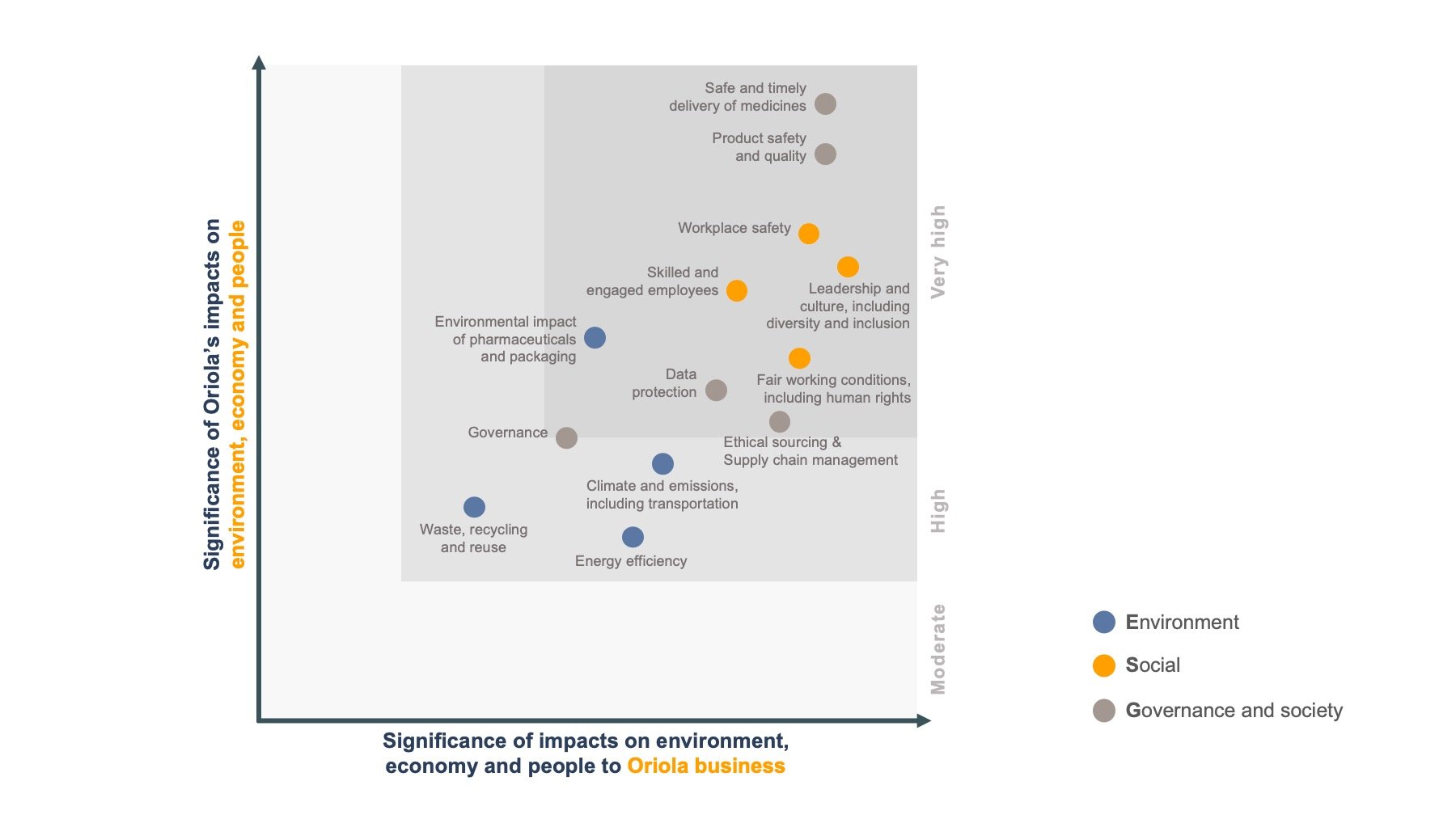Double-materiality assessment
Oriola’s sustainability agenda is based on a double-materiality assessment conducted in 2023. In addition to defining the focus areas of our sustainability efforts, the materiality analysis guides our work and actions related to sustainability. Through this analysis, we have identified, evaluated and prioritised the key topics in our value chain that are important to both our stakeholders and our business. This has involved considering both the impact we have on society and the potential risks and opportunities that these identified themes may create for our business.
Identifying potentially material topics
The starting point for Oriola’s materiality analysis was to identify the sustainability topics that are potentially relevant to Oriola. The list of sustainability topics was derived from a review of Oriola’s disclosures and external sources, including topics defined material to the company through the previous materiality assessment, sustainability standards and frameworks (e.g., the GRI and the SASB), the UN Sustainable Development Goals (SDGs), and global megatrends.
Gathering stakeholder perspectives
Both qualitative and quantitative information from Oriola’s stakeholders was collected through an online sustainability survey and in-depth interviews with external and internal stakeholders, conducted by our external partner. The online survey was targeted at employees and management while the external stakeholders covered several groups, such as investors, pharmaceutical companies, pharmacies, suppliers and authorities. We received more than 500 responses through the survey.
Assessing impacts and identifying most material sustainability topics
In Oriola’s double materiality assessment, both outward impacts (the impact on society and the planet at different stages of Oriola’s value chain) and inward impacts (the impact on Oriola’s overall performance and business in terms of risks and opportunities that have or will have an impact on corporate value) were evaluated.
The impact assessment consisted of:
- Assessing the significance of sustainability impacts at the different stages of Oriola’s value chain
- Assessing the potential impacts of financially material sustainability topics on Oriola’s ability to create value
- Mapping stakeholders’ main information needs and evaluating the importance of sustainability topics based on the needs
- Compact listing of the primary current and future sustainability opportunities and risks
- Grouping and prioritising topics at internal workshops
- Identifying the most material sustainability topics for Oriola
The results of the 2023 double-materiality assessment have been presented in the below materiality matrix.
These results have provided the basis for Oriola’s sustainability agenda, including actions, targets and KPIs. Material topics were finally formed into three key sustainability themes: Environment, Social and Governance and society. The materiality matrix has been approved by Oriola’s Management Team.
The identified material topics reflect Oriola’s business and strategy. They address our ongoing efforts to enhance wellbeing of people and minimise the environmental impact of our operations. Going forward, we will also increasingly focus on the sustainability of our value chain, both in terms of climate impact and human rights.
To continuously improve our understanding of what is material to us while remaining attentive to our stakeholders’ evolving sustainability expectations, we aim to conduct a sustainability materiality analysis every third year.
Background
Oriola’s first materiality assessment was conducted in 2018 and a second assessment focusing on social responsibility topics was conducted in 2021. Oriola’s 2023 materiality assessment was expanded by considering all three perspectives of the concept of double materiality: impact materiality, financial materiality, and stakeholder’s information needs.
